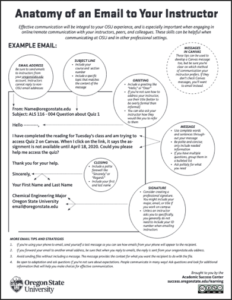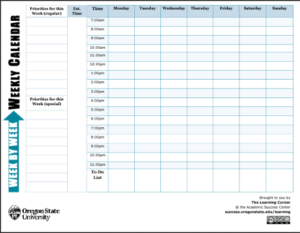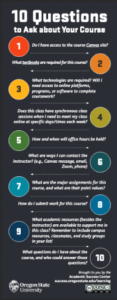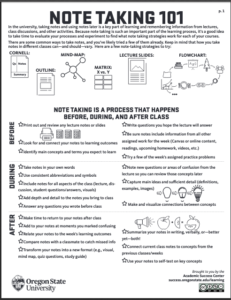There are many tools to support your students’ success as they adapt to remote or online learning. Here are some recommendations from ASC Staff. Click on the visual to see the full-size version of each tool.
Anatomy of an Email
My favorite resource from the remote and online learning page is the Anatomy of an Email visual. Honestly, as a student I probably racked up tens of hours sitting in front of a blank screen wondering how in the world to write an email to an instructor. The anatomy of an email resource makes it so easy to see how to style an email to be professional, effective, and concise!
Weekly Calendar
I’m a big fan of the Weekly Calendar. It’s a tool that works in many contexts. Creating a schedule for the week can help students find or make time for what’s important to them. Now that we’re all working from home it seems even more important to have a way to delineate work vs. play, make time for relaxation, and stay productive with more distractions. The Weekly Calendar is one of the best antidotes to procrastination. If I sketch out what I’m going to work on and when, I’m more likely to follow through with that plan.
Elements of a Productive Study Space
My favorite resource is the Productive Study Space worksheet. As someone who’s working full time and doing an online graduate program, I definitely understand how challenging it can be to make your space work. This tool helps students consider how to get in the mindset for remote working or studying, how to set up and stick to a schedule, and what to do if they’re not able to dedicate a single space to work or study. These considerations have been crucial to helping me continue to do my work this term, and this tool can definitely help other students think about what will work for them.
10 Questions to Ask about Your Course
I wish I’d asked these sorts of questions when I was in college. Asking and answering these questions equips students with a kind of a blueprint. They figure out how to engage in the course, who they can go to for help, and how assignments will impact to their grade. Knowing these details early on sets a student up with an understanding of the course’s trajectory and expectations. If they run into any challenges later, already knowing how to reach out—and who to start with—can be a huge stress reliever.
Note-Taking 101
In synchronous lectures, information might be lost if notes aren’t taken. In contrast, online content often remains available, making note-taking feel less urgent. Even when learning remotely, note-taking is an important starting point for recording information to later transfer to long-term memory. I like the Note-Taking 101 packet because it provides strategies for taking notes and making effective use of those notes throughout the study cycle. When I staff the ASC table for events (for graduate or undergraduate students), the note-taking packet always goes fast! Also, this packet has unicorns in it. And unicorns are cool.
Interested in more tools and strategies to share with students? Check out our Remote & Online Learning webpage.






